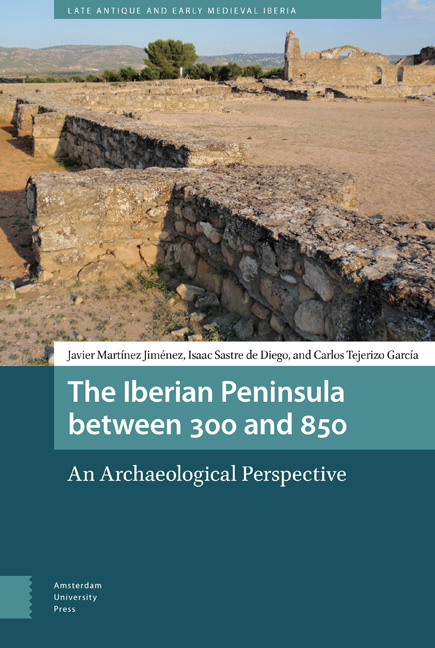Book contents
- Frontmatter
- Contents
- List of Figures
- Acknowledgements
- Preliminary notes
- Preface
- Introduction: An archaeological perspective on the Iberian peninsula between Rome and the Middle Ages
- Part 1 The Late Roman period
- Part 2 The post-Roman period
- Part 3 The Early Middle Ages
- Appendix 1 Site reference table
- Appendix 2 Maps
- Appendix 3 Lists of rulers
- Abbreviations
- Bibliography
- Index
8 - The formation of a new Medieval materiality
Published online by Cambridge University Press: 10 December 2020
- Frontmatter
- Contents
- List of Figures
- Acknowledgements
- Preliminary notes
- Preface
- Introduction: An archaeological perspective on the Iberian peninsula between Rome and the Middle Ages
- Part 1 The Late Roman period
- Part 2 The post-Roman period
- Part 3 The Early Middle Ages
- Appendix 1 Site reference table
- Appendix 2 Maps
- Appendix 3 Lists of rulers
- Abbreviations
- Bibliography
- Index
Summary
During the eighth and ninth centuries, the political situation of the Iberian peninsula was radically transformed as the result of the Umayyad conquest of 711 and the later counter-attacks by Carolingian armies from beyond the Pyrenees. This reorganization of the power structures deeply disrupted the post-Roman political, social, and economic system which had developed during Late Antiquity and set the foundations for the developments of the Middle Ages. However, despite what historical accounts may say about this period, from an archaeological perspective there was no abrupt change from a Late Antique into a Medieval world and there was, as expected, a period of transition and adaptation by Iberian societies.
As has been highlighted in the previous chapters, Late Antique material culture and its associated monumentality and settlement patterns were the results of the transformations of the late Roman world. The Christianization of the urban and rural landscapes, together with the simplification of the economy, the reorganization of the administration and the emergence of new material forms of social prestige are the key processes that explain Late Antique material culture. These evolving transformations broke down and were replaced during the eighth and ninth centuries. It will be evident that there is not a clear ‘closing’ date for our final section. As happens when dealing with material culture and archaeology, it is very difficult and usually pointless to highlight a single moment for the transition from one period to another. For this reason, this chapter covers a period roughly dated between 711 and 850. These two dates mark the beginning and the end of a period during which Late Antique materialities were still present, even if gradually being replaced by new developments.
In this last chapter we will, therefore, look at the main areas of Late Antique material culture discussed in the previous chapters, and briefly explain the political and material circumstances of this period and their reflection in monuments and other archaeological elements. This will be achieved by first explaining the political developments and transformations of both the Umayyad and the Christian territories, leading to their respective periods of state formation. We will then look into the emergence of new political forms of representation, the development of religious materialities and, finally, the transformation of the urban and rural landscapes.
- Type
- Chapter
- Information
- The Iberian Peninsula between 300 and 850An Archaeological Perspective, pp. 267 - 314Publisher: Amsterdam University PressPrint publication year: 2018



